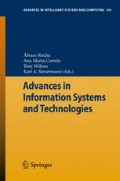Abstract
Data from four field studies are analyzed to find the patterns of knowledge acquisition activity in software development projects with respect to other cognitive activities such as documentation, coding and V&V. The data are obtained from self-recorded activity time slips approach. Data are codified based on an information source model, which is related to Nonaka and Takeuchi’s knowledge creation model. It shows that knowledge acquisition activities account for almost 15% of the total effort. We also find out that this effort, in most cases, cannot be restricted to the first phase of the project during requirement and architectural design, which is expected from waterfall or disciplined processes. About half of the learning is done during the code implementation even within a disciplined process. This finding is in line with one value of the Agile philosophy that promotes team interactions and users involvement for the whole project duration.
Access this chapter
Tax calculation will be finalised at checkout
Purchases are for personal use only
Preview
Unable to display preview. Download preview PDF.
References
Henninger, S.: Tools Supporting the Creation and Evolution of Software Development Knowledge. In: International Conference on Automated Software Engineering (ASE 1997), pp. 46–53 (1997)
Robillard, P.N.: The Role of Knowledge in Software Development. Commun. ACM 42(1), 87–92 (1999)
Xu, S., Rajlich, V., Marcus, A.: An Empirical Study of Programmer Learning During Incremental Software Development. In: 4th IEEE International Conference on Cognitive Informatics, pp. 340–349 (2005)
Bjornson, F.O., Dingsoyr, T.: Knowledge Management in Software Engineering: A Systematic Review of Studied Concepts, Findings and Research Methods Used. Inf. Softw. Technol. 50(11), 1055–1068 (2008)
Ko, A.J., DeLine, R., Venolia, G.: Information Needs in Collocated Software Development Teams. In: 29th International Conference on Software Engineering, pp. 344–353 (2007)
Kolb, D.: Experiential Learning: Experience as the Source of Learning and Development. Prentice Hall, Englewood Cliffs (1984)
Argyris, C., Schon, D.A.: Organizational Learning: A Theory of Action Perspective. Addison-Wesley, Reading (1978)
Wenger, E.: Communities of Practice: Learning, Meaning and Identity. Cambridge University Press, Cambridge (1998)
Nonaka, I., Takeuchi, H.: The Knowledge-Creating Company – How Japanese Companies Create the Dynamics of Innovation. Oxford University Press, Oxford (1995)
Gendreau, O., Robillard, P.N.: Exploring Knowledge Flow in Software Project Development. In: International Conference on Information, Process, and Knowledge Management (eKNOW 2009), pp. 99–104 (2009)
Doxygen Manual, http://www.doxygen.org
WPF Tutorial.net, http://www.wpftutorial.net
Carver, J., Jaccheri, L., Morasca, S., Shull, F.: Issues in Using Students in Empirical Studies in Software Engineering Education. In: Ninth International Software Metrics Symposium (METRICS 2003), pp. 239–249 (2003)
Höst, M., Regnell, B., Wohlin, C.: Using Students as Subjects – A Comparative Study of Students and Professionals in Lead-Time Impact Assessment. Empir. Softw. Eng. 5(3), 201–214 (2000)
Porter, A., Votta, L., Basili, V.R.: Comparing Detection Methods for Software Requirements Inspection: A replicated experiment. IEEE Trans. Softw. Eng. 21(6), 563–575 (1995)
Porter, A., Votta, L.: Comparing detection methods for software requirements inspection: A replication using professional subjects. Empir. Softw. Eng. 3(4), 355–380 (1998)
Germain, E., Robillard, P.N.: Engineering-Based Processes and Agile Methodologies for Software Development: A comparative case study. J. Syst. Softw. 75(1-2), 17–27 (2005)
Gendreau, O., Robillard, P.N.: Knowledge Conversion in Software Development. In: Nineteenth International Conference on Software Engineering and Knowledge Engineering (SEKE 2007), pp. 392–395 (2007)
Author information
Authors and Affiliations
Corresponding author
Editor information
Editors and Affiliations
Rights and permissions
Copyright information
© 2013 Springer-Verlag Berlin Heidelberg
About this paper
Cite this paper
Gendreau, O., Robillard, P.N. (2013). Knowledge Acquisition Activity in Software Development. In: Rocha, Á., Correia, A., Wilson, T., Stroetmann, K. (eds) Advances in Information Systems and Technologies. Advances in Intelligent Systems and Computing, vol 206. Springer, Berlin, Heidelberg. https://doi.org/10.1007/978-3-642-36981-0_1
Download citation
DOI: https://doi.org/10.1007/978-3-642-36981-0_1
Publisher Name: Springer, Berlin, Heidelberg
Print ISBN: 978-3-642-36980-3
Online ISBN: 978-3-642-36981-0
eBook Packages: EngineeringEngineering (R0)

